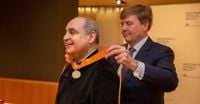In a shocking turn of events, the world of opera mourns the loss of Pierre Audi, the influential French-Lebanese opera director who passed away unexpectedly at the age of 67 in Beijing, China. The news of his death was announced by France's Minister of Culture, Rachida Dati, on social media on May 3, 2025, leaving many in the arts community in disbelief.
Audi, who was born in Beirut, Lebanon, in 1957, became a defining figure in the Dutch opera scene during his tenure as the artistic director of De Nationale Opera in Amsterdam, a position he held from 1988 until 2018. His impact on the opera world was profound, establishing him as one of the leading figures in the field.
His career began in London, where he founded the Almeida Theatre, gaining recognition for his experimental approach to theater. Reflecting on his move to the Netherlands in 2018, Audi shared with NRC, "I had never been to the Netherlands. I was only thirty and had little experience in opera. But there was a click, and I felt safe and welcome. I had plans and a full address book." This sense of belonging propelled him into a three-decade-long career that would reshape the landscape of Dutch opera.
During his time at De Nationale Opera, Audi achieved significant acclaim for his innovative interpretations of classic operas, including Monteverdi's works, Mozart's compositions, and Wagner's epic "Ring des Nibelungen." His ability to create a new visual language for opera was noted as a hallmark of his directorial style, allowing audiences to experience the art form in unprecedented ways.
One of his notable contributions was his approach to staging Monteverdi's operas, which involved opening up the auditorium and creating an intimate atmosphere that resonated with audiences. His vision transformed the performance space, enabling a direct connection between the performers and the audience. This was exemplified in iconic performances, such as that of mezzo-soprano Graciela Araya as Penelope in "Il ritorno d'Ulisse in Patria," where the audience could palpably feel her longing and sorrow.
Audi's productions were characterized by their simplicity and emotional depth. He introduced concepts like adventure seats, which allowed audience members to sit in close proximity to the action, thereby enhancing their experience of Wagner's characters who were stripped of traditional Teutonic stereotypes and placed in a unique, contemporary context. His work demonstrated the emotional resonance that modern operas could achieve, as seen in Tan Dun's "Marco Polo," which moved audience members to tears.
In addition to his role at De Nationale Opera, Audi also served as the artistic director of the Holland Festival from 2005 to 2014, further solidifying his influence in the arts. Since 2019, he had been associated with the prestigious Festival d'Art Lyrique d'Aix-en-Provence, where he continued to push the boundaries of opera.
His sudden passing, reportedly due to a heart attack, has left a significant void in the opera community. The National Opera & Ballet expressed their devastation at his loss, stating, "The opera world loses an absolute giant, who tirelessly and devotedly committed himself to the art form. He has been an enormous force in the arts, as a director, curator, and of course, as a director."
In remembrance, the French Minister of Culture, Rachida Dati, emphasized Audi's lifelong dedication to artistic creation, noting, "Through his demands, his freedom, and his unique vision, he has profoundly renewed the language of opera. He leaves behind an immense body of work, a living legacy, and an indelible mark on the opera world."
Audi's legacy extends beyond his directorial achievements. He initiated the Studio of De Nationale Opera, fostering new talent and ensuring the future of opera in the Netherlands. His commitment to collaboration with renowned artists, such as Nikolaus Harnoncourt, showcased his belief in the importance of bringing together diverse voices in the arts.
Looking ahead, the 2025-2026 season will include a production of Wagner's "Tristan und Isolde," a testament to Audi's lasting influence on the company and the operatic repertoire.
As the arts community reflects on Pierre Audi's remarkable career, it is clear that his contributions have left an indelible mark on the Dutch opera landscape. His innovative spirit and dedication to the craft have inspired countless artists and audiences alike, ensuring that his legacy will continue to resonate for years to come. Pierre Audi is survived by his wife and two children, who undoubtedly carry forward the artistic spirit he embodied.


